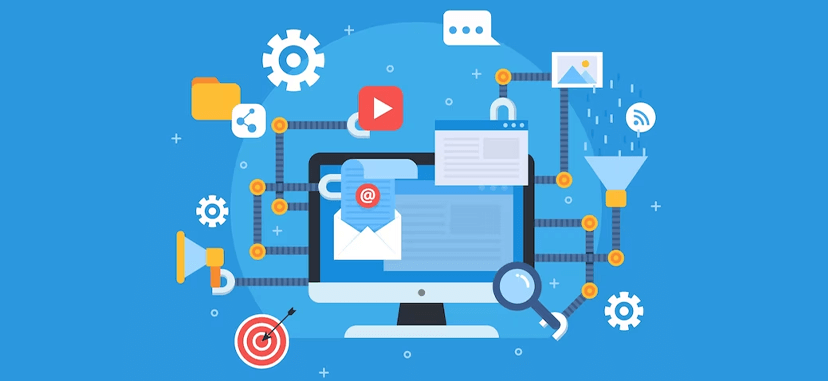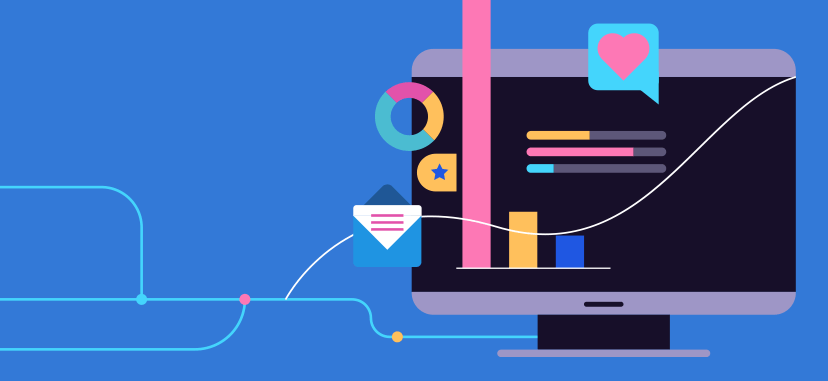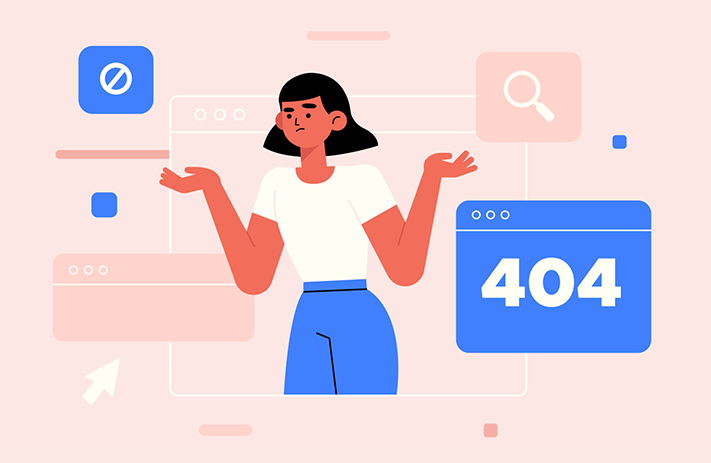
Click the button to start reading
11 Easy Marketing Automation Examples for Lead-Generation on Autopilot
Imagine this – a customer books a product demo on your website. They automatically get a confirmation email from a sales rep with what they need to do before a call. After the call, they enter a new automation sequence that sends them follow-up emails every few days, offering new features and answering frequently asked questions. They also join an audience group so they’ll see your ads when they’re scrolling on social media. All of these marketing automation examples make it more likely that someone will make a purchase. And the best part? It all happens without any additional effort from you.
We talk a lot about automation at Teamly. Whether you introduce automations to streamline your ecommerce business or process automations to improve project management, the benefits of automation are the same. You save time and energy, and the important stuff gets done anyway.
Today, we’re exploring marketing automation. What it is, why it’s important, and some marketing automation examples you can apply to your business.

Explain marketing automation
Let’s start with some basics of automation. Marketing automation is using software that executes all the tasks or processes within your business without manual work. Some of the tasks that might benefit from automation are…
- Email marketing
- Managing ads
- Customer segmentation
- Lead acquisition
- Social media management
Anything manual or repetitive in your marketing efforts can probably be automated. The key is finding things that don’t require personalization so software can easily handle the task for you.
As for how marketing automation actually works, most softwares work with the following logic:
Trigger > Condition > Action
The trigger is whatever begins the automation. A condition is the criteria that must be met for the automation to occur. And the action is what happens when the trigger and condition are met.
The benefits of automation are that rather than manually tracking the trigger and condition, an automation starts without any work on your part. This can influence the experience of everyone involved – from customers to team members.
Benefits of marketing automation
- Scalability. The biggest reason for marketing automation is to help your business scale.
- Reduces Human Error. Marketing automations cut back on human error – typos, decimal point errors, and all the other things that can happen are reduced with automation!
- Cost savings. Marketing automation software frees up your employees for higher-value work and reduces shrinkage, amongst other things.
- Streamlined and standardized processes. Marketing automation helps you better standardize and quality control the output.
- Transparency and compliance. With centralized ecommerce automation software, the information stays where oversight and tracking can occur. This can support things like compliance or data privacy.
- Customer and employee satisfaction. Customers benefit from consistent, on-brand communication, while employees are freed from dull or repetitive tasks.

11 Marketing Automation Examples
Welcome or onboarding emails
New lead or purchase? This is when your customer is most engaged, so don’t miss the opportunity to bring them into your brand story properly.
Depending on the nature of your product or service, you might choose a welcome or onboarding email. A welcome email is more aspirational – think a letter from the founder, a bit of your story, or something else that emotionally connects. On the other hand, an onboarding email can be a bit of that but is usually more informational or instructional. It might include product education, helpful resources, or other tips. If your product is more elaborate or requires education, an onboarding email ensures customers get the most out of their purchase.
A welcome or onboarding sequence has a simple trigger – someone signs up or makes a purchase. From there, you can add them into an email sequence that fires automatically, usually with a time delay between emails.
A/B testing email marketing campaigns
A/B testing, or split testing, is a method for comparing two versions or variables. When it comes to marketing automation, you can split-test everything from an email headline to using percentages versus dollar amounts when offering discounts.
Automation will allow you to run both versions concurrently, and some software even sends out the better-performing email automatically as soon as enough data is collected.
Lead nurturing
Another example of marketing automation is lead nurturing. Like an onboarding sequence, lead nurturing is an email sequence meant to warm up a cold lead. It might begin when someone visits a page on your website, opts into a lead magnet, or otherwise enters your sales funnel.
For this type of marketing automation, your goal is to give potential customers the information they need without overwhelming them or making them unsubscribe. It’s a careful balance of finding what adds value, what encourages the sale, and what obstacles to purchase you can remove for them. Some examples of content for your lead nurturing sequence are a calendar scheduling link, resources on the product, introductory content, or discounts.
Birthday and anniversary greetings
Have you ever gotten a happy birthday email from a brand you love? With a personalized or time-limited discount, a birthday or anniversary automation is a fun and thoughtful way to engage with your customers and potentially bring old customers back to your website.
It’s a careful balance of being helpful, not creepy here! People love personalization when it’s something they opt into. So rather than just scraping their birthday, ask them for it! Some of the best brands do this by inviting customers to a loyalty program with exclusive discounts. With that information, you can tailor your offers so they only see the most relevant offers.
Loyalty emails
Like a birthday or anniversary email, a loyalty email rewards loyal customers for their repeat business. You can choose the milestones that make sense for your business, whether a dollar amount spent or a completed number of sessions.
Depending on your automation software, you can designate a trackable event as your “trigger.” Once the customer hits this, they’ll automatically receive an incentive or communication from your brand.
Abandoned cart marketing automation
An abandoned cart email goes out automatically to a customer who added a product to their cart but never completed the purchase. It might ask customers if they forgot something or proactively answer any outstanding questions getting in the way of their checkout. Whatever messaging you go with, the ultimate goal is to give them one-click access to the item they were close to buying before.
An abandoned cart marketing automation is easy to add in most ecommerce tools and only requires the potential customer to log in with their email address when they add their product to the cart.
Re-engagement email marketing campaigns
A re-engagement campaign might kick in several weeks or months after your last engagement with a customer. This type of email sequence tool aims to warm up a cold lead by reminding them of how you can help with your products or services. You might let them know about new products, updated features, success stories, or other relevant updates with the intention of re-engaging.
To automate this, you’ll set up a sequence that sends after a set period of inactivity.
Survey, feedback, review, testimonials
One of the most overlooked parts of the marketing cycle is the follow-up after the purchase. Survey responses, feedback, or customer reviews are invaluable to marketing! Not just because they offer valuable feedback on what you’re doing, but they can help shape your offer and messaging for prospective buyers.
Feedback automation might have a trigger like a set period passing or an action being completed. For example, if it’s a course, they might receive the email a week after they complete it. The key here is to engage your customers when your offer is still fresh in their minds. Give them a reason to share feedback – whether it’s value for your small business or a discount on future services – and keep this automation running for ongoing feedback.
Lead magnet or gated content
A lead magnet or gated content is a powerful way to capture contact information for visitors to your website. This might be an eBook, a free download, or an article only available upon login.
Rather than making the contact wait, create a marketing automation that delivers content once their email is added to your list. It’s simple, effective, and increases the chances that they’ll actually use what you send them as they’re currently in a discovery phase.
Social media automation
While we’ve talked a lot about email, social media is another example of how marketing automation can make your day-to-day easier. One such example is a social media scheduling tool. Whoever manages social media for your team might decide on a fixed interval to create content for your channels. They can add visual assets, a caption, hashtags, location, and any other relevant data. And then, once the scheduled time comes, all that’s required is a click of a button.
While this isn’t as low-effort as some of the other automation, creating content for social media in batches and scheduling can save you significant time on a day-to-day basis.
Transactional messages and updates
Another example of marketing automation is your transactional messages and updates. The best example of this is an ecommerce business. Some common automated emails might be notifying the customer the order was received, that their order was shipped, or that a refund was received.
These may be more operational than marketing, but they still present opportunities for personalization. By customizing your transactional automation, you can build your brand voice into more communications, upsell, or share additional resources to give buyers the best experience engaging with your product.
















